Introduction
In the competitive landscape of legal services, effective marketing strategies are essential for attracting and retaining clients. Two prominent approaches—PPC (Pay-Per-Click) advertising and social media marketing—each offer distinct advantages that can significantly impact a law firm’s success.
- While PPC focuses on immediate visibility through targeted ads on search engines,
- social media marketing fosters long-term relationships and brand engagement through interactive content.
Understanding the nuances of these strategies, including how to effectively reach and engage the target audience, is crucial for law firms looking to optimize their advertising efforts.
This article delves into the key differences and similarities between PPC and social media marketing, exploring:
- Their effectiveness
- Audience targeting
- Budgeting
- Overall return on investment
to provide legal professionals with valuable insights for their marketing endeavors.
PPC vs. Social Media Marketing: Key Differences and Similarities
PPC (Pay-Per-Click) advertising and social media promotion each hold unique positions within the digital advertising ecosystem, yet both aim to attract potential clients effectively. Internet advertising for lawyers, such as PPC advertising, allows law firms to place targeted ads on search engines, paying only when users click on them. This model enables legal professionals to effectively use internet advertising for lawyers to reach individuals actively seeking legal services, making it particularly effective for immediate client acquisition.
In contrast, social media promotion emphasizes brand awareness and engagement, utilizing platforms such as Facebook, LinkedIn, and Instagram to connect with users based on their interests and demographics. While PPC can yield rapid results, social media strategies nurture long-term relationships with clients, fostering loyalty over time. The distinction is illustrated by the growing recognition of PPC’s effectiveness; recent statistics indicate that 84% of brands and marketers report successful outcomes from their PPC campaigns.
Additionally, a well-personalized PPC landing page can enhance effectiveness by 5%, demonstrating the importance of tailored content in capturing client interest. Furthermore, Amazon’s ad statistics show an impressive average of 83 million impressions per day with a conversion rate of 9.44%, showcasing the potential of PPC strategies in generating substantial engagement. Additionally, it’s worth noting that 61% of audio listeners pay attention to audio ads, compared to just 19% of TV watchers who actively watch TV ads, which broadens the context of advertising strategies beyond just PPC and social media promotion.
Both strategies possess their advantages, but their success depends on their incorporation into a unified promotional plan that aligns with the company’s goals. As the landscape evolves, staying updated with marketing statistics will be vital for clinic owners looking to maximize their advertising efforts.
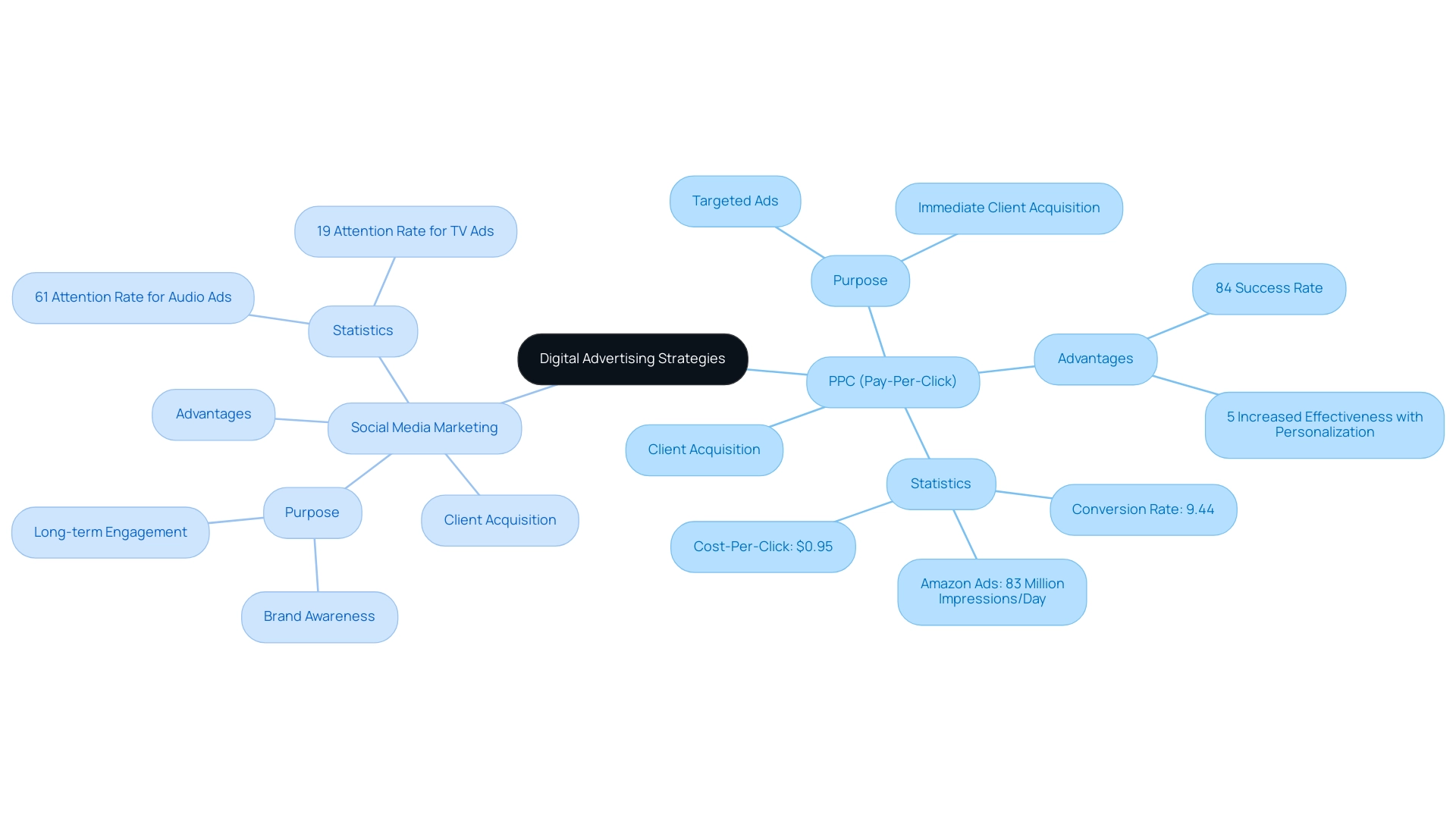
The Effectiveness of PPC Advertising for Law Firms
Internet advertising for lawyers, particularly through PPC advertising, stands out as a highly effective strategy for legal practices, primarily due to its capacity to target specific keywords that are directly relevant to legal services. For example, a personal injury lawyer can strategically bid on phrases such as ‘best personal injury attorney near me,’ ensuring their advertisements are prominently displayed to potential clients actively seeking legal assistance. This focused targeting often leads to superior conversion rates compared to traditional advertising methods.
Moreover, with 81% of people researching legal services online before contacting an attorney, implementing internet advertising for lawyers through PPC becomes crucial. Furthermore, statistics show that 50% of people who search locally for businesses like lawyers on their mobile visit an office within 24 hours, underscoring the immediacy and effectiveness of PPC in driving local traffic. Platforms such as Google Ads provide robust analytics tools, enabling legal practices to meticulously track their return on investment (ROI).
A well-optimized PPC campaign can generate substantial returns, with some companies reporting an impressive return of $3 for every dollar spent on advertising. Furthermore, with 72% of consumers showing a preference for a blend of digital and conventional strategies, internet advertising for lawyers, especially through PPC advertising, arises as an appealing choice for prompt lead generation, ensuring that legal practices can efficiently draw in potential clients in a competitive environment.
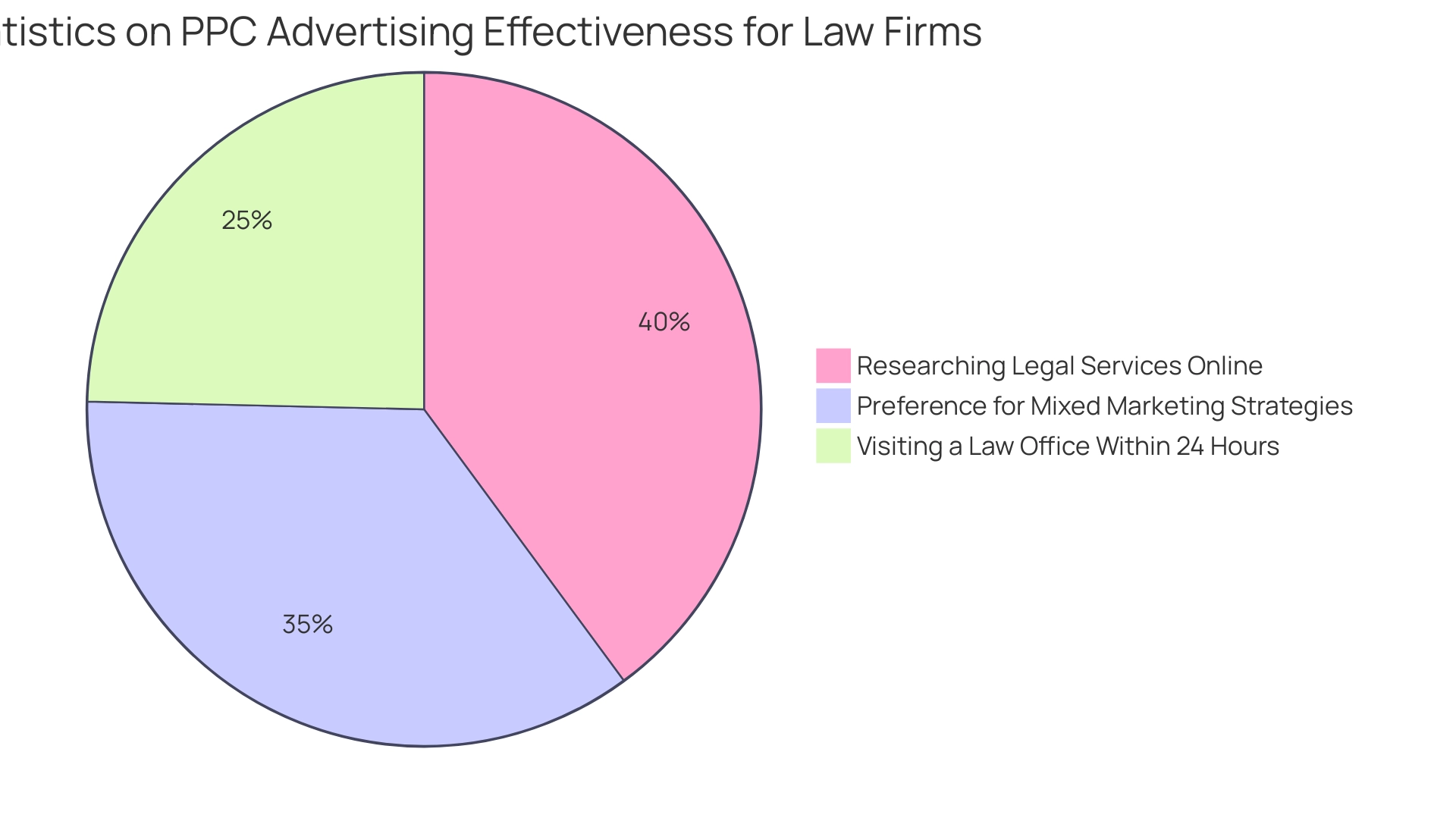
Harnessing Social Media Marketing for Legal Success
Social media marketing offers legal practices a unique opportunity to connect with potential clients in a personal and interactive way. Platforms such as LinkedIn facilitate the sharing of valuable content, including articles on legal rights and insightful case studies, which help establish legal professionals as thought leaders in their field. Notably, video content on social media is incredibly effective, generating 1,200% more shares than text and images combined, indicating its potential to enhance visibility.
Furthermore, social media enables targeted advertising customized to user interests and behaviors, allowing legal practices to reach specific demographics aligned with their areas of expertise. For instance, family law practices can strategically direct ads to individuals who have recently altered their marital status. However, it is essential for legal practices to also invest in long-term SEO strategies, as a study from Ahrefs shows that pages ranking in top positions are typically over 2 years old.
This highlights the importance of consistent investment in SEO to achieve and maintain visibility online. By effectively leveraging social media alongside a long-term SEO strategy, legal practices can significantly enhance their visibility through internet advertising for lawyers, foster trust, and ultimately convert followers into clients, ensuring they remain competitive in an evolving digital landscape. As Ivan Vislavskiy, co-founder of Comrade Digital Promotion, aptly states,
Without legal promotion statistics, law firms may be wasting money on ineffective campaigns, missing out on potential new clients, and falling behind their competition.
This highlights the necessity of a strategic approach in social media to drive client engagement and retention.
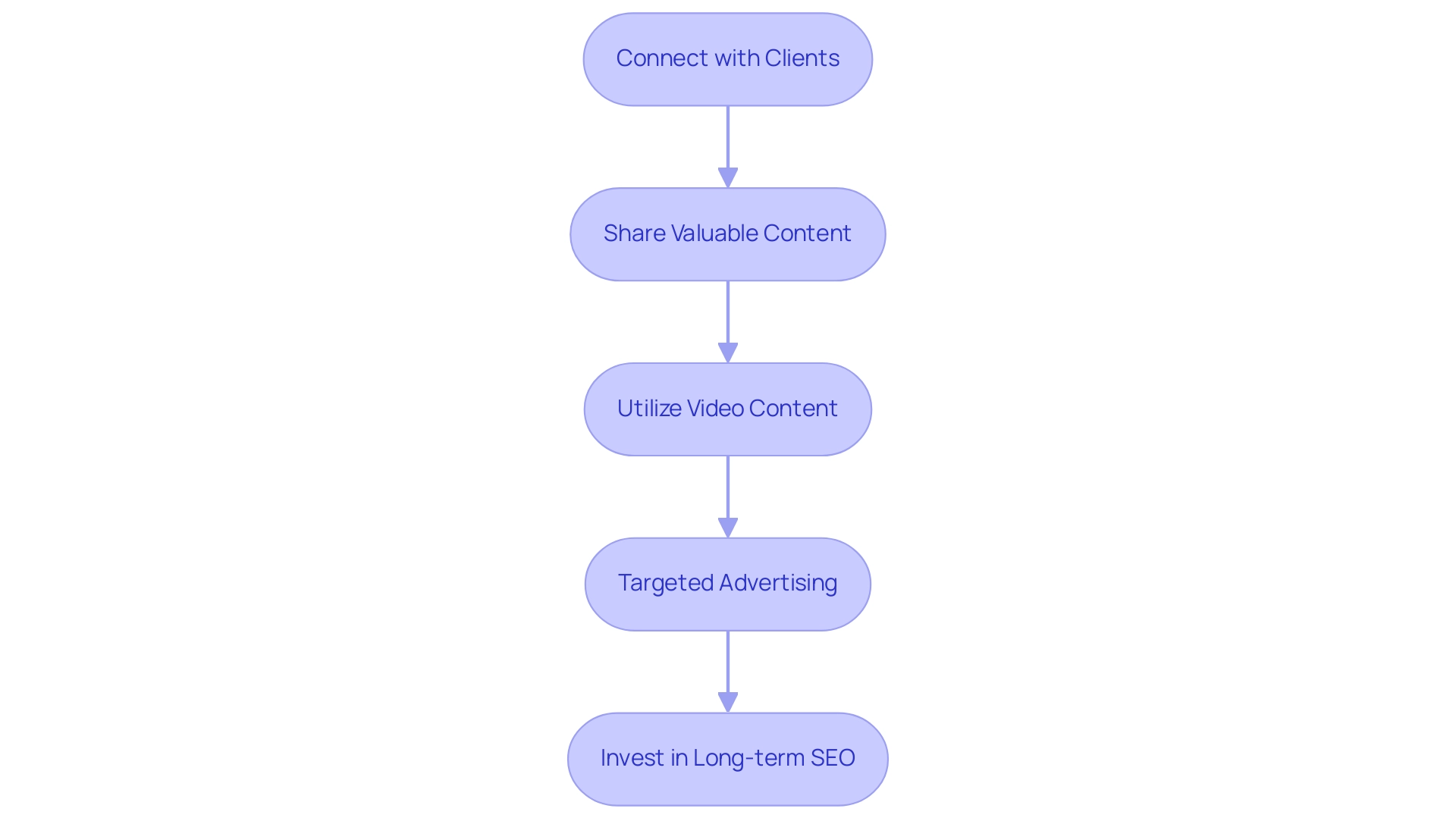
Understanding Your Target Audience in Digital Advertising
Understanding the target audience is crucial for the effectiveness of PPC and social media marketing campaigns in the realm of internet advertising for lawyers. Law practices must conduct a thorough analysis of demographic data—including age, gender, location, and interests—to craft messages that resonate with potential clients. For instance, in PPC advertising, selecting keywords that address specific client concerns, such as divorce attorney for men or criminal defense lawyer for first-time offenders, can significantly enhance visibility and relevance.
Similarly, on social media platforms, insights into audience behavior guide the type of content shared, whether it includes:
- Informative articles
- Client testimonials
- Engaging videos
Notably, research indicates that 50% of individuals who perform local searches for legal services on mobile devices visit a law office within 24 hours. This statistic highlights the urgency of effective audience targeting.
Additionally, with 37% of legal practices investing in LinkedIn advertising, this platform presents another avenue for reaching potential clients effectively. By aligning internet advertising for lawyers with audience insights, legal practices can enhance engagement rates and conversions, resulting in more successful promotional outcomes. Moreover, the present environment indicates that 75% of lawyers dedicate less than 10% of their budgets to social outreach, implying a significant opportunity for those eager to invest in comprehending their audience more effectively.
The case study on blogging in legal practices reveals that 89% utilize blogs for client development, demonstrating the dual purpose of blogging for both client engagement and personal interest. Moreover, legal practices can use a complimentary website evaluator to assess their online visibility against rivals, further improving their digital promotion strategies. Thus, the integration of demographic data not only informs PPC and social media strategies but also positions legal practices to meet the evolving expectations of legal service clients in 2024.
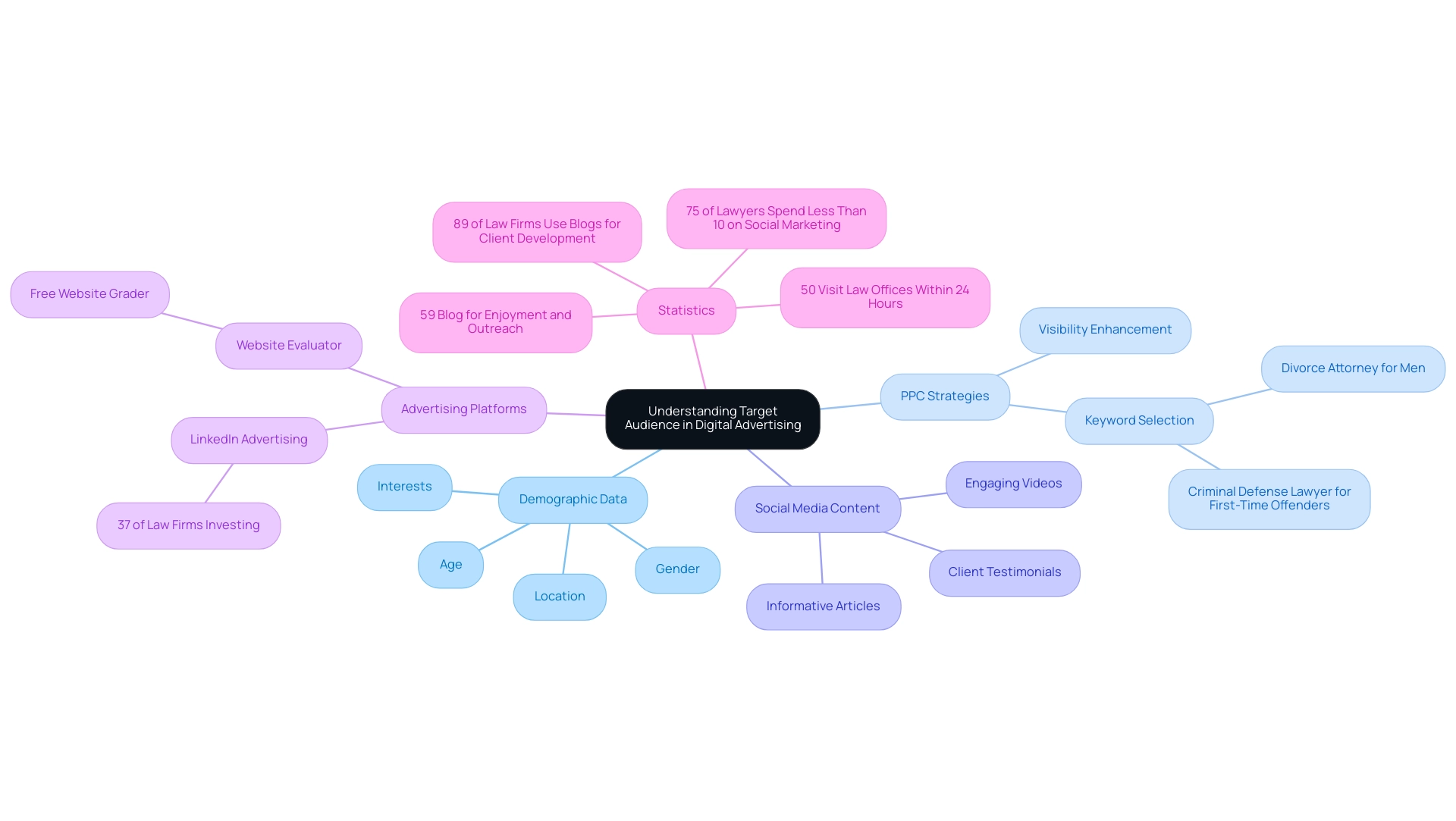
Budgeting and ROI: Making the Most of Your Advertising Spend
Efficient budgeting is essential for legal practices striving to enhance the effectiveness of their PPC and social media promotional activities in the realm of internet advertising for lawyers. Creating a clear advertising budget that aligns with the overall promotional strategy is essential. For PPC advertising, costs can fluctuate dramatically due to keyword competition, necessitating diligent monitoring of spending to achieve a positive return on investment (ROI).
In parallel, social media promotion encompasses both organic and paid strategies; thus, companies must evaluate which approach best corresponds with their financial capabilities. According to industry insights, 75% of lawyers allocate less than 10% of their budget to social ads, indicating a potential area for growth. As Karin Conroy, Founder of Conroy Creative Counsel, states, “intelligent, refined, and tactical promotion for legal practices is essential for attaining desired results.”
Furthermore, utilizing analytics tools for tracking ROI is crucial for assessing the effectiveness of each campaign. This allows legal practices to refine their strategies based on performance data. Significantly, case studies show that 49% of legal practices regard acquiring web leads as their most effective promotional channel.
However, with 86% failing to collect email addresses and 35% of potential leads’ calls going unanswered, the need for prompt communication is clear. A staggering 67% of individuals prefer companies that respond promptly, with 70.7% of lawyers managing to reply within an hour. Additionally, 50% of people who search locally for lawyers on mobile visit an office within 24 hours, highlighting the urgency for law firms to invest in effective PPC and social media marketing.
By concentrating on strategic budgeting and robust ROI tracking, legal professionals can ensure that their expenditures on internet advertising for lawyers yield substantial returns.
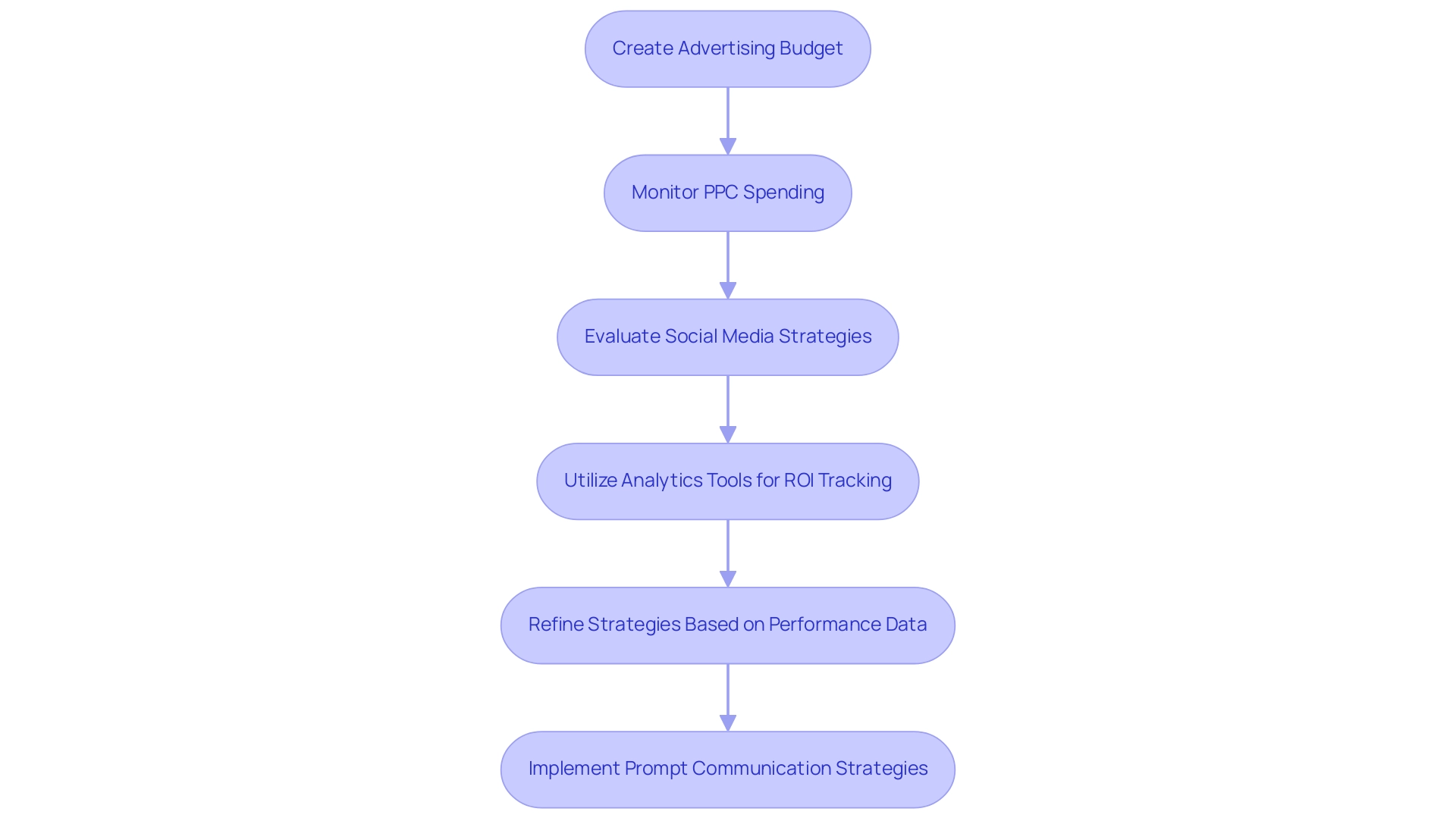
Conclusion
PPC and social media marketing each play a pivotal role in the digital marketing strategies of law firms, yet they serve distinct purposes. PPC advertising excels in driving immediate visibility and attracting clients actively seeking legal services, while social media marketing focuses on building long-term relationships and engaging audiences through interactive content. The effectiveness of PPC is underscored by its ability to target specific keywords and drive local traffic, making it an essential tool for immediate client acquisition. Conversely, social media marketing fosters brand loyalty and enhances visibility through valuable content and targeted outreach.
Understanding the target audience is critical for both strategies. Law firms that effectively analyze demographic data can create tailored messages that resonate with potential clients, ultimately boosting engagement and conversion rates. Moreover, strategic budgeting and ROI tracking are vital components of any marketing campaign, ensuring that law firms can maximize their advertising spend and achieve desired outcomes.
In conclusion, integrating PPC and social media marketing into a cohesive strategy can significantly enhance a law firm’s ability to attract and retain clients. By leveraging the strengths of each approach, legal professionals can optimize their marketing efforts, stay competitive in a rapidly evolving landscape, and ensure that their advertising investments yield substantial returns. Emphasizing a data-driven approach will empower law firms to navigate the complexities of digital marketing successfully, aligning their strategies with the needs and behaviors of their target audiences.

